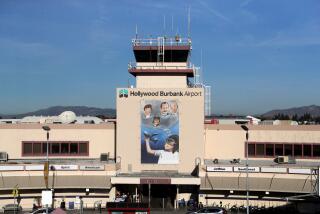L.A. to Investigate Financial Risks of Joining Burbank Airport Authority
- Share via
A Los Angeles City Council committee Friday demanded more study of the possible financial liability from noise lawsuits before considering whether the city should try to join the Burbank-Glendale-Pasadena Airport Authority.
Although Los Angeles has twice declined membership on the independent authority, which operates Burbank Airport, Councilman Joel Wachs revived the question in January.
Wachs asked the city attorney to determine whether joining the authority could give the city more influence in decisions affecting noise in Los Angeles neighborhoods caused by jetliners taking off from Burbank Airport.
In a report delivered to the Industry and Economic Development Committee on Friday, Deputy City Atty. William L. Waterhouse concluded that voting membership would give the city “greater voice” on the authority. But he cautioned that “whether that greater voice would lead to ‘greater protection’ against noise is difficult to predict.”
The report also was inconclusive on the related question of whether the city, if it joined the authority, could be held responsible for debts or losses that the authority could not pay.
Authority members have worried openly about the possibility of crushing financial burdens from noise lawsuit awards.
The Airport Authority has been engaged in a running legal battle over noise with residents of Los Angeles neighborhoods east of the airport. It suffered a crucial setback in 1985 when the California Supreme Court ruled that jetliner noise is a “continuing nuisance,” which allows the same homeowner to file repeated lawsuits for repeated instances of noise.
In the authority’s 1986 annual report, its legal counsel said he could not estimate the amount of damages the authority might have to pay when the suits are settled, or to settle future suits.
At Friday’s committee meeting, Chairwoman Joan Milke Flores--the only council member present--said the report failed to come up with a clear recommendation. She ordered the city attorney to conduct an eight-week study in cooperation with the Department of Airports and Wachs’ office.
Appeals Court Ruling
In his eight-page report, Waterhouse told the committee that a recent appeals court ruling in a case involving the airport affirmed the principle that “the debts, liabilities and obligations of the authority do not constitute debts, liabilities or obligations” of the member cities.
Although the ruling was vacated on other grounds, Waterhouse said, “other courts would presumably also hold that the authority is solely responsible for all other liabilities as well.”
He added, however, that, if the authority could not pay its debts, “it is conceivable . . . that creditors could then attempt to recover from the member cities.”
Waterhouse declined to estimate the potential liability, venturing only that “it is possible that the Airport Authority will be subject to substantial damage awards in noise litigation.”
Waterhouse recommended a detailed review of the authority’s potential liability before the council considers whether to seek membership.
On the question of whether Los Angeles could use membership on the authority to obtain power over airport operations, Waterhouse again said he could not reach a firm conclusion.
Anti-noise protesters have pressured the authority for years to limit the number of flights from the airport. With backing from Wachs, they are pushing a “share the noise” campaign, calling for more flights to take off toward the east--over the three cities that own the airport--instead of over the Los Angeles neighborhoods of Studio City, North Hollywood and Van Nuys.
Lack of Power
The chairman of the authority has repeatedly protested that, under federal court rulings, the authority has no power to enforce such rules, which would infringe on the authority of the Federal Aviation Administration.
Rules for the nine-member authority provide a limited veto power to each of the three cities that formed it. Waterhouse said the City of Los Angeles would acquire the same veto power if it became a member.
The veto power, he said, applies only to revenue bonds and other forms of indebtedness, payment of surplus revenues, or an increase in the area of the airport’s noise impact, as measured in 1978 under a formula prescribed by state law.
Victor Gill, a spokesman for the authority, said the airport has reduced the area of noise impact so much since 1978 that it is unlikely any decision could be taken to bring that element of the veto power into play.
Before attempting to join the authority, Waterhouse advised, the city should “seek clarification and/or revision of the wording and legal interpretation of the veto power.”
More to Read
Sign up for Essential California
The most important California stories and recommendations in your inbox every morning.
You may occasionally receive promotional content from the Los Angeles Times.














